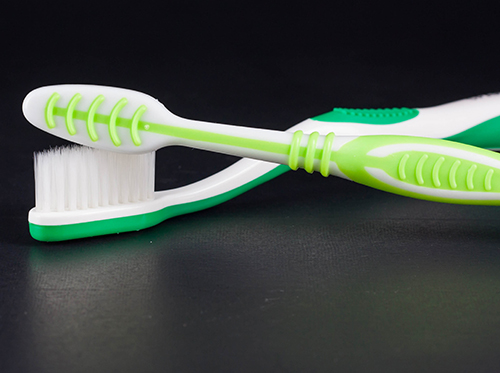
We get it. You’re working out and could use a boost. It’s 2 a.m. and that essay won’t write itself (darn it). You’re in the middle of a meeting that goes on and on and . . .
It’s easy to reach for an energy drink when you’re feeling a bit low on, well, energy. These drinks are loaded with caffeine, and, like coffee or tea, can help you feel more alert. But before you pop that top, let’s look at how energy drinks affect your dental health.
- Energy drinks are very acidic.
Acid levels are measured using the pH scale, which ranges from 0 (most acidic) to 14 (most alkaline). Saliva has a normal pH somewhere between 6.2 and 7.6, which helps neutralize any acidic conditions in the mouth and promotes a healthy oral environment. But saliva’s neutralizing effect can be overwhelmed by highly acidic foods and drinks.
Why are higher levels of acids bad for our teeth? Acids strip away minerals like calcium from tooth enamel, the minerals which make enamel the strongest substance in the body. This demineralization weakens the enamel’s protective outer structure and can lead to enamel loss, sensitivity, tooth discoloration, and decay.
Many energy drinks are among the most acidic beverages on the market. Mineral loss in your enamel starts to occur when the pH balance in the mouth falls to 5.5 or less. Lemon juice has a pH between 2 and 3. White vinegar has a pH of 2.5. Energy drinks can range from 1.5 to 3.5 on the pH scale! Studies show that regular consumption of energy drinks greatly increases the risk and severity of dental erosion.
- Most energy drinks are full of sugar.
Sugar is easily metabolized, or broken down, by the body. When our bodies break down food, energy is released. That’s why companies add sugar as well as caffeine to their energy drinks.
The plaque bacteria which create cavities also use sugars in these drinks as an energy source, converting sugars into acids. Just like acidic foods and drinks, bacterial acids break down the mineral structure in tooth enamel. You might notice small white spots when the enamel starts to erode—and a cavity starts to develop.
- Energy drinks aren’t just bad for your dental health.
The temporary burst of energy you get from all the sugar in energy drinks is followed by a sugar crash when blood sugar levels go down again, and you can feel tired, weak, or shaky.
Even worse, one energy drink might contain three to four times the amount of caffeine found in a cup of coffee. Excess caffeine interferes with healthy sleep. It can cause changes in heart rate, blood pressure, and anxiety levels.
Children and teens are especially vulnerable to the effects of large amounts of caffeine while their brains and bodies are still developing. That’s why the American Academy of Pediatrics recommend no energy drinks at all for children and teenagers. The FDA suggests that adults should not take in more than 400 milligrams per day of caffeine, while energy drinks can range from around 80 to 400 mg per can.
If you do have the occasional energy drink, what’s the best way to protect your teeth and gums?
- Don’t linger over your drink. Sipping slowly over time just bathes your teeth and gums in sugar and acids over a longer period.
- Drink water when you’re done. Water helps wash away sugars and acids, hydrates, and promotes healthy saliva production.
- If the team at Fabre Family Dental Care of Marrero gives gum a thumbs up, chew a piece of sugarless gum after downing an energy drink to increase saliva flow and help neutralize acids in the mouth.
- Wait at least 30-60 minutes to brush after finishing an energy drink. Acids in the drink weaken enamel, and brushing immediately can be abrasive to the tooth surface.
- Eat a healthy diet rich in proteins, complex carbs, vitamins, and minerals to feel more energetic.
- Keep up with good dental hygiene. Brush twice each day for two minutes and floss daily, or more often as recommended by Dr. Keith J. Fabre Jr..
If you notice signs of enamel erosion—sensitivity, front teeth which are becoming transparent or rough around the edges, yellowish discoloration, or white or brown spots on your enamel—it’s time for a talk with Dr. Keith J. Fabre Jr.. When caught early enough, treatment is available which can stop further erosion from harming your teeth.
The team at Fabre Family Dental Care of Marrero in Marrero, or your doctor, can help you discover healthy ways to stay focused and energetic. Your workout, your essay, your meeting, and, above all, your healthy body and healthy smile will thank you!




